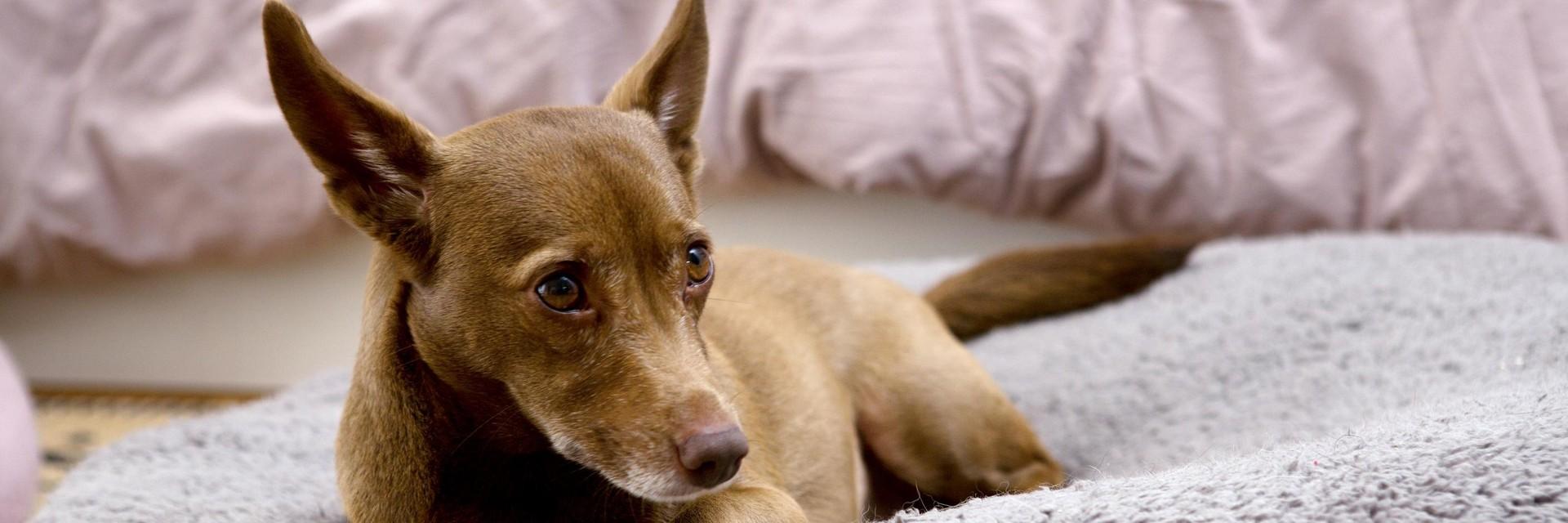
Fireworks Are Frightening to Pets
Your pet and fireworks: what you need to know
The fear of fireworks is common among pets and poses a significant animal welfare problem1-2. When fireworks go off, some animals will panic and try to escape from the frightening noises and bright lights. This distress often takes them a long time to recover from.
Where does the fear of fireworks come from?
If we consider how animals perceive noises and lights, it’s easy to understand why many of them are scared of fireworks.
- Dogs and cats perceive sounds much louder than humans because they can hear better.3
- Animals struggle to make sense of firework noises as they are not only extremely loud but also unpredictable. They associate such noises with danger, and all their (survival-) instincts tell them to run to a place of safety.4
- To animals, the flashes of light produced by fireworks seem just as threatening as the noises.
- The overall effect is comparable to thunder and lightning during storms, except that they last much longer (up to 48 hours before and after the festivities) - which often trigger a fear response in animal (astraphobia).5,6
- Fireworks are closer to the ground than thunderstorms, so the impact can be even more overwhelming. What’s more, the lights and noises are accompanied by smoke and acrid smells.
Sometimes just one negative experience of fireworks can be enough to trigger a fear in a pet that it did not have before. Periods when fireworks go off repeatedly (usually during festivities such as New Year’s Eve) can reinforce an animal’s adverse reaction to noise over time (so called sensitisation).

Preventative measures
Helping your pet to become well-socialised can play a major role in preventing the fear of fireworks from becoming ingrained. A pet’s breed, age and sex can also have a significant impact on their sensitivity to fireworks, as can the circumstances in which they were reared and whether or not they have been neutered.7
For animals to be well-socialised, they must have as many positive experiences as possible during the most sensitive phase of their development.8 Well-socialised animals can cope much better with unfamiliar situations later in life than animals that have had little or no positive experiences during their sensitive phase. Nevertheless, it is important to introduce them to possible new stimuli carefully and in appropriate doses during this phase to avoid overloading them!
Fear of fireworks is a serious animal welfare issue
Fireworks expose animals – not just pets, but also wild animals and livestock – to immense stress, which in extreme cases can prove fatal.9 Many dogs run away when startled by fireworks, and tragically some end up being run over. Anxiety, fears and phobias have far-reaching consequences. You should do as much as you can to make the situation easier for your pet.
References:
1. Fireworks and animal welfare, RSPCA. [accessed 2024 Nov 4]. https://assets.publishing.service.gov.uk/media/5f92de15d3bf7f35f06ae3b4/fireworks-evidence-submission-rspca.pdf
2. Firework aversion in cats and dogs as reported by Dutch animal owners, Veterinary and Animal Science. [accessed 2024 Nov 4]. https://doi.org/10.1016/j.vas.2024.100402
3. Animals with the best hearing in the world. IFAW. [accessed 2024 Nov 7]. https://www.ifaw.org/international/journal/animals-best-hearing-world
4. Fireworks: An explosion of fear for animals, The Humane Society of the United States. [accessed 2024 Nov 7]. https://www.humanesociety.org/resources/fireworks-explosion-fear-animals
5. Fear of Thunderstorms and Fireworks, PennVet. [accessed 2024 Nov 4]. https://www.vet.upenn.edu/docs/default-source/ryan/ryan-behavior-medicine/fear-of-thunderstorms-amp-fireworks-(pdf).pdf?sfvrsn=c15e17ba_2
6. What to know about astraphobia, MedicalNewsToday [accessed 2024 Nov 4]. https://www.medicalnewstoday.com/articles/astraphobia
7. Genomic analysis of firework fear and noise reactivity in standard poodles, Canine Medicine and Genetics. [accessed 2024 Nov 4]. https://doi.org/10.1186/s40575-023-00125-0
8. Developmental Stages, Canine Welfare Science. [accessed 2024 Nov 4]. https://caninewelfare.centers.purdue.edu/behavior/puppy-development/developmental-stages/
9. Fireworks have long-lasting effects on wild birds. [accessed 2024 Nov 7]. https://www.mpg.de/19528005/1121-ornr-fireworks-have-long-lasting-effects-on-wild-birds-987453-x

